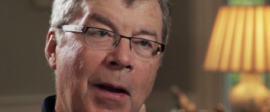Best of Daily Reflections: Managing Your Lamp
Daily Reflection / Produced by The High Calling
The eye is the lamp of the body. So, if your eye is healthy, your whole body will be full of light; but if your eye is unhealthy, your whole body will be full of darkness. If then the light in you is darkness, how great is the darkness!
Matthew 6:22
My optometrist put a photographic scan of my eyes on a computer screen and began telling me all about the health of my whole body. Apparently, by looking into a patient’s eye, he can detect evidence of diabetes, allergies, fatigue, certain auto-immune diseases, high blood pressure, certain cancers, high cholesterol, thyroid disease, and on and on. Dr. Andrew Iwach of the American Academy of Ophthalmology explains it this way, “The eye is the only place in the body where, without surgery, we can look in and see veins, arteries, and a nerve.” All of this made me think of Jesus’ words, “The eye is the lamp of the body.”
When we open our eyes, we put out the welcome mat for the world. Everything we see crawls past our eyelids and into the inner control center of our heart, mind, soul, and will. And once we see something, we can’t unsee it. That’s why Jesus warns us to be careful what we look at.
Pay special attention to the twist that Jesus introduces. We are conditioned to think of light as “good” and darkness as “bad.” But in this case Jesus introduces us to a kind of light that can actually be darkness in disguise. That’s what he means when he says, “If then the light in you is darkness, how great is the darkness.”
The mere possibility of this should make us shudder. It is possible to believe ourselves to be walking in the light when in fact we are walking in darkness—to be convinced we are right when we are dead wrong. In context, Jesus has just spoken of material wealth and taking care not to store up treasures on earth but in heaven. Materialism has one hundred ways to disguise greed and self-indulgence as forms of light. In fact, it may well be that every evil in life has a closet full of disguises to help it look like light. That’s why it is so easy to rationalize immoral, unwise, and unfaithful behaviors and convince ourselves that we are being moral, wise, and faithful.
In aviation, there is a phenomenon called “The Graveyard Spiral.” A pilot flying at night or in clouds will sometimes experience sensory illusion or spatial disorientation. Without knowing it, the pilot will steer the plane into a downward spiral. I’ve heard report of chilling recordings of cockpit conversations with these pilots where they refuse the instruction of air traffic controllers to pull up or straighten out because to do so defies their natural senses.
It is easy to get disoriented, to experience sensory illusion that confuses light and dark, to experience spatial disorientation that confuses heaven and earth. It is important to manage the lamp of our bodies. So …
- Be cautious—evil wears many disguises.
- Be humble—you may be wrong.
- Be teachable—you may need to change your mind.
- Be faithful—be ready to do the hard work of lifestyle-obedience to Jesus.
QUESTIONS FOR FURTHER REFLECTION: Describe some important places in your life where your mind has been changed. What factors influence your convictions about right and wrong? Where do you see light disguised as darkness in the world?
PRAYER: Lord God, you have taught that freedom comes from living in the truth. But sometimes truth is difficult to know and harder still to swallow. Forgive me when I second-guess your truth. Grant that I might be humble, teachable, and faithful in all things. Amen.
______________________________
Borrowing and Lending
Is it okay for Christians (or Christian businesses) to borrow money? To encourage others to borrow money? To lend money? What does the Bible have to say about appropriate interest rates for loans and credit? Come join us at our virtual table for a discussion about Borrowing and Lending. It’s difficult to purchase a car or a home or an education without agreeing to pay installments on that commodity for many years into the future. Is this what God has in mind for us and for our resources, or are we overthinking things here? Are there practical steps we can take to avoid borrowing money, and does it matter if we’re borrowing money from a family member or from a financial institution? We welcome your stories, your thoughts, and your experiences, whether you’re a borrower or a lender. What have you learned about God, his great gift of redemption, and his work of restoration through the experiences of borrowing and lending the resources entrusted to you?












